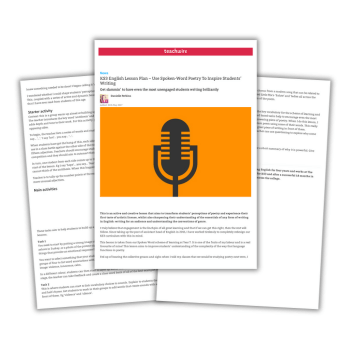This is an active and creative poetry KS3 lesson. It aims to transform students’ perceptions of poetry and give them their first experience of artistic license.
Students will also sharpen their understanding of the essentials of any form of writing in English. This includes writing for an audience and understanding the conventions of genre.
Engagement is the linchpin of all great learning. If you get this right, the rest will follow. Fed up of hearing the collective groans and sighs when I told my classes that we would be studying poetry next term, I knew something needed to be done.
I began calling it ‘spoken word’ or ‘slam’ – avoiding the word ‘poetry’ at all costs. I wondered whether I could shape students’ perceptions of poetry with semantics alone and to my surprise, I really did.
This, coupled with a series of active and dynamic lessons created some of the most fiery, political and intelligent poetry that I have ever read from students of this age.
Poetry KS3 starter activity
Start with a group warm up aimed at building up an awareness of antithesis in poetry and its power to create tone. Introduce the key word ‘antithesis’ and explain to students that contrasts are one of the ways that a poet adds depth and tone to their work.
For this activity, you want to split the classroom into two different groups on opposing sides. To begin, list a series of words. Ask students to shout back the antithesis of those words. Eg ‘I say ‘evil’… you say… ‘…’. ‘I say ‘hot’… you say… ‘…’.
When students have got the hang of this, each side of the room can work in small groups to create a list of adjectives to use in a slam battle against the other side of the room.
Small groups then combine to decide on a list of their favourite 15 adjectives. Encourage students to be really thoughtful in their choice of these words – this is a competition and they should aim to outsmart their opponents!
In turn, one student from each side comes up to the front and says their adjective in the same format as you did at the start of the lesson. Eg I say ‘hope’… you say… ‘fear’.
This happens on a carousel rotation until one student from one side cannot think of the antithesis. When this happens, the other team win a point.
Tally up the number points at the end of the activity and question students about the effect of some of the more unusual adjectives.
Danielle Perkins has been teaching English for four years and works at The Spires College as Assistant Head of English. She has responsibility for KS3 and also supports the development of Assessment without Levels across the college. Download more KS3/4 poetry lesson plans.











